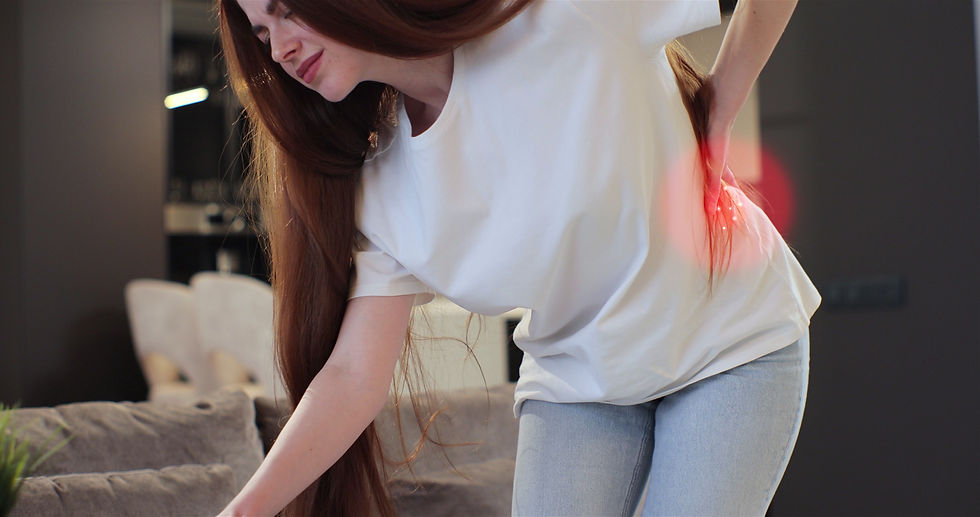Can Massage Help You Sleep Better?
- Aaron Cygnarowicz
- May 21, 2024
- 3 min read
In today's fast-paced world, quality sleep often feels like a luxury. Many of us struggle with falling asleep, staying asleep, or waking up feeling refreshed. While there are numerous strategies and remedies to improve sleep, one often overlooked method is massage therapy. But can a massage really help you sleep better? Let's explore the connection between massage and sleep.

The Science Behind Sleep and Relaxation
Before delving into how massage can improve sleep, it's essential to understand the basics of sleep and relaxation. Sleep is a complex biological process crucial for our physical and mental well-being. Good sleep enhances memory, mood, and cognitive function, while poor sleep is linked to various health issues, including anxiety, depression, and cardiovascular problems.
Relaxation plays a significant role in preparing the body for sleep. The body needs to shift from a state of alertness, driven by the sympathetic nervous system, to a state of rest, controlled by the parasympathetic nervous system. This transition is where massage can be particularly beneficial.
How Massage Promotes Better Sleep
1. Reduces Stress and Anxiety
Massage therapy is well-known for its ability to reduce stress and anxiety. When we are stressed, our bodies produce higher levels of cortisol, a hormone that can interfere with sleep. Massage has been shown to decrease cortisol levels while increasing serotonin and dopamine, neurotransmitters that help regulate mood and promote relaxation .
2. Eases Muscle Tension
Muscle tension can be a significant barrier to sleep. Whether due to physical exertion, poor posture, or the daily grind, tight muscles can cause discomfort and pain, making it difficult to relax. Massage helps to release muscle tension, improve circulation, and promote a sense of physical ease, which can translate to better sleep .
3. Boosts Serotonin and Melatonin
Serotonin is a precursor to melatonin, the hormone responsible for regulating sleep-wake cycles. By increasing serotonin levels, massage can indirectly boost melatonin production, making it easier to fall asleep and maintain a regular sleep pattern .
4. Improves Circulation
Improved circulation is another benefit of massage. Better blood flow means that muscles and tissues receive more oxygen and nutrients, which can help reduce pain and inflammation. Enhanced circulation also supports the removal of metabolic waste, which can contribute to a feeling of overall well-being and readiness for sleep .
Types of Massage for Better Sleep
Not all massages are created equal when it comes to promoting sleep. Here are some of the most effective types:
1. Swedish Massage
This is a gentle, relaxing massage that uses long, flowing strokes. It's designed to relax the entire body, improve circulation, and alleviate tension.
2. Deep Tissue Massage
While more intense than Swedish massage, deep tissue massage targets deeper layers of muscle and connective tissue. It's particularly effective for chronic pain and muscle tightness, which can interfere with sleep.
3. Aromatherapy Massage
Incorporating essential oils like lavender, chamomile, or sandalwood into your massage can enhance relaxation and promote sleep. These oils are known for their calming properties and can help create a soothing atmosphere.
4. Reflexology
This type of massage focuses on applying pressure to specific points on the feet, hands, and ears. It's based on the theory that these points correspond to different body organs and systems. Reflexology can help reduce stress and improve overall relaxation, which is conducive to better sleep.
Practical Tips for Incorporating Massage into Your Routine
1. Schedule Regular Sessions
Consistency is key. Regular massage sessions can help maintain lower stress levels and muscle tension, promoting ongoing sleep improvements.
2. Create a Relaxing Environment
If you can't visit a professional therapist, consider self-massage techniques or ask a partner to help. Use calming music, dim lighting, and essential oils to create a serene environment.
3. Combine with Other Relaxation Techniques
Massage can be even more effective when combined with other relaxation techniques, such as deep breathing exercises, meditation, or a warm bath before bedtime.
Massage therapy offers a natural and effective way to enhance sleep quality by reducing stress, easing muscle tension, boosting serotonin and melatonin levels, and improving circulation. Whether through professional sessions or at-home practices, incorporating massage into your routine could be the key to a more restful night's sleep. So, next time you find yourself tossing and turning, consider booking a massage – your body and mind will thank you.
---
References:
1. [Sleep.org](https://www.sleep.org)
2. [National Center for Complementary and Integrative Health (NCCIH)](https://www.nccih.nih.gov)
3. [Mayo Clinic](https://www.mayoclinic.org)
4. [American Massage Therapy Association (AMTA)](https://www.amtamassage.org)
5. [Journal of Clinical Sleep Medicine](https://jcsm.aasm.org)



Comments